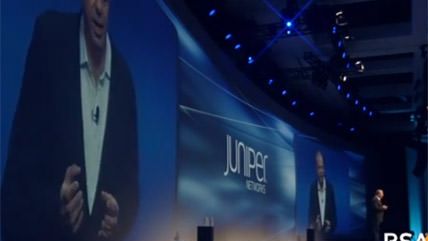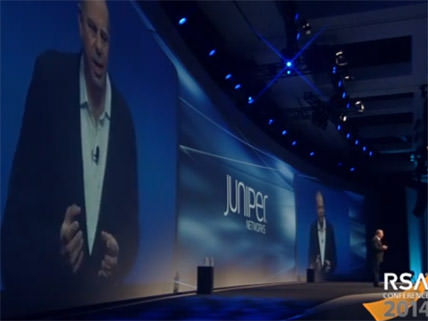Security Exec: 'First World Outrage' About Privacy Is a Joke


Do Americans–particularly those in the tech industry–really care about privacy? Nawaf Bitar, a security executive with Juniper Networks, posed this question at the RSA Conference on cybersecurity yesterday, and offered a few ideas on how to act if they want to affect change.
"Our privacy is being invaded. Our intellectual property is being stolen. The attack on our information is outrageous," said Bitar, blaming "criminal organizations, corporate thieves, hostile governments, friendly governments." He gave the U.S. government the benefit of the doubt that the post-9/11 surveillance systems were well-intentioned but have caused "stunning" invasions of privacy.
Most Americans would likely agree with the sentiments he expressed, but Bitar doesn't think they're doing anything meaningful about privacy breaches and are even complicit for standing by as it continues.
"It's easy to talk about outrage. Liking a cause on Facebook is not outrage. Retweeting a link is not outrage," he said, contrasting such forms of "First World outrage" with historical anti-government action, such as the Tiananmen Square protests and the self-immolation of Tibetans.
Bitar is correct in that internet activism is sometimes without impact. Critics of slacktivism can point to studies that show Facebook "likes" for charities actually result in less financial support. But, physical protests aren't necessarily a better way to solve internet issues. For example, "The Day We Fight Back" rallies against the National Security Agency earlier this month fell flat, whereas the web-based initiatives against the Stop Online Piracy Act in 2012 played a major role in preventing the bill from moving forward.
As PC Magazine notes, the security executive "only briefly touched on solutions" of his own.
Bitar called upon the crowd to reevaluate whether or not privacy is a "real" value or just a "stated" one. He also suggested that in order to maintain a "moral high ground," industry workers would have to resist waging cyberwars of aggression and instead could develop "defenses" that would "interfere with attackers… break algorithms… [and] disrupt data collection" to the point that malicious entities would get frustrated and give up.
Editor's Note: As of February 29, 2024, commenting privileges on reason.com posts are limited to Reason Plus subscribers. Past commenters are grandfathered in for a temporary period. Subscribe here to preserve your ability to comment. Your Reason Plus subscription also gives you an ad-free version of reason.com, along with full access to the digital edition and archives of Reason magazine. We request that comments be civil and on-topic. We do not moderate or assume any responsibility for comments, which are owned by the readers who post them. Comments do not represent the views of reason.com or Reason Foundation. We reserve the right to delete any comment and ban commenters for any reason at any time. Comments may only be edited within 5 minutes of posting. Report abuses.
Please to post comments


I never saw the point of self-immolation as protest. They just wait for the fire to die out and the problem goes away.
Personally, I think orange bananas would be more effective. And by orange banana I mean lighting your farts on fire.
I thought it was just people who were taking the old "die in a fire meme" literally.
..."He gave the U.S. government the benefit of the doubt that the post-9/11 surveillance systems were well-intentioned"...
Very nicely paved road; where's it go?
A quant little town called hellmouth.
What about us? /Residents of Hell, Michigan
They are FREEZING right now.
Sunnydale High School?
I've just started watching Buffy again from the beginning (I had only watched one season during its run). God damn Sarah Michelle Gellar is hot. And Alyson Hannigan. And Charisma Carpenter.
I have to say that Willow was always my favorite, but that show is.absolutely polluted with hotness.
Not a fan of Eliza Dushku?
So why would anyone trust Juniper not to install any backdoors for the NSA in their products...
Exactly. Who the F would buy from these people?
Sure, Bitar, you in front of the tank first.
"He also suggested that in order to maintain a "moral high ground," industry workers would have to resist waging cyberwars of aggression and instead could develop "defenses" that would "interfere with attackers... break algorithms... [and] disrupt data collection" to the point that malicious entities would get frustrated and give up."
Sure, because if you make things frustrating, governments just give up - they sure wouldn't employ force to get their way!
If you make use of force politically unfavorable and/or expensive it is a good strategy.
If you make use of force politically unfavorable and/or expensive it is a good business model for getting a government contract.
FTFY
That is the better answer, C-Tox (is that too much like a rapper name?)
I'm certainly displeased by what's happening to my privacy rights vis-?-vis the government, but that's not my number-one concern. It's just one of a boatload of illegal incursions the government is making on my liberties and on the liberties of others.
RSA Conference? RSA still has some explaining to do.
Yeah, no shit.
I don't know how people so used to the phrases 'free as in beer' and 'free as in speech' can get this wrong.
The issue isn't whether it's real or stated; it's very real. The heart of the issue is that personal information privacy and private property ownership have been so confabulated in the general ability to tell the gov't to fuck off that nobody has any concept of the difference. The government isn't 'stealing' the transmissions you freely broadcast, it's stealing your ability to contract and associate freely AND charging you for it.
Unless it's a crime to call Yemen or call someone who's called Yemen or call someone who's called someone... the government can take no action. And if they're spending tax money on mountains of unactionable intelligence, thoughts on information privacy aside, it's theft.
You misunderstand him. He's asking people to decide if they REALLY care about privacy, or if they only SAY they care about privacy but will do not nothing about it. In other words, he's telling them to "put up or shut up".
Privacy can totally exist as a value, but that doesn't mean the populace at large really values it (though I think they do; it's simply a matter of concentrated costs versus dispersed benefits). He's making a distinction between the stated preference and the revealed preference.
Retweeting a link is not outrage," he said, contrasting such forms of "First World outrage" with historical anti-government action, such as the Tiananmen Square protests and the self-immolation of Tibetans.
He's right about that. We are a bunch of a soft lazy bastards. None of us would be willing to set ourselves on fire and die for our beliefs because none of us really have any beliefs anymore. The only thing that would make this country riot is a disruption of welfare services. You could pack their children into boxcars and they still wouldn't stand down Berkut riot police.
"The National Security Agency's capability at any time could be turned around on the American people, and no American would have any privacy left, such is the capability to monitor everything: telephone conversations, telegrams, it doesn't matter. There would be no place to hide. If a dictator ever took over, the N.S.A. could enable it to impose total tyranny, and there would be no way to fight back."?Senator Frank Church, 1975
Today, regaining your online Privacy means going Abroad
http://www.americansrighttoprivacy.com